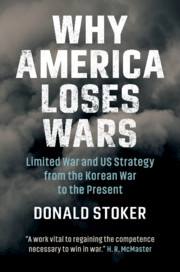Book contents
- Why America Loses Wars
- Why America Loses Wars
- Copyright page
- Dedication
- Contents
- 1 Are We at War? What Do We Want? And Do We Want to Win?
- 2 The Way We Think about War (Particularly Limited War) Is Broken: Here Is How We Fix It
- 3 The Political Objective: Why Nations Fight (Limited) Wars
- 4 Constraints: Or Why Wars for Limited Aims are So Difficult
- 5 Strategy: How to Think about Fighting for a Limited Political Objective
- 6 And You Thought the War Was Hard: Ending the War and Securing the Peace
- Conclusion: Is History Rhyming?
- Acknowledgments
- Notes
- Bibliography
- Index
Conclusion: Is History Rhyming?
Published online by Cambridge University Press: 09 August 2019
- Why America Loses Wars
- Why America Loses Wars
- Copyright page
- Dedication
- Contents
- 1 Are We at War? What Do We Want? And Do We Want to Win?
- 2 The Way We Think about War (Particularly Limited War) Is Broken: Here Is How We Fix It
- 3 The Political Objective: Why Nations Fight (Limited) Wars
- 4 Constraints: Or Why Wars for Limited Aims are So Difficult
- 5 Strategy: How to Think about Fighting for a Limited Political Objective
- 6 And You Thought the War Was Hard: Ending the War and Securing the Peace
- Conclusion: Is History Rhyming?
- Acknowledgments
- Notes
- Bibliography
- Index
Summary
Learning how to think about limited war is a critical skill for American political and military leaders. Currently, the US is failing to win its war in Afghanistan, a war now being fought to preserve the Afghan government. The US has been fighting for seventeen years, and there is no indication that victory is at hand. One of the biggest rèasons for this is the Taliban’s possession of sanctuary in Pakistan. As long the Taliban has this, and is willing to keep fighting, the US cannot guarantee the survival of Afghanistan’s government. Additionally, the most likely type of war in the immediate future – and the most likely one that the US will face – is a war fought for limited aims. India and Pakistan have bitter, unresolved border issues, and China is a revisionist regional power determined to become a global one. The US cannot afford to continue making the same mistakes in regard to so-called limited wars that it has made for the last seventy years.
Keywords
- Type
- Chapter
- Information
- Why America Loses WarsLimited War and US Strategy from the Korean War to the Present, pp. 221 - 231Publisher: Cambridge University PressPrint publication year: 2019

